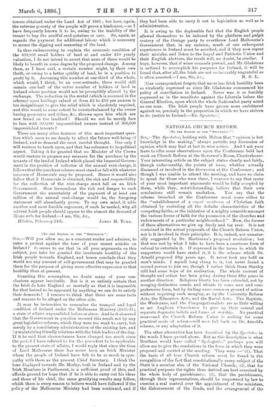[TO THE EDITOR OF THE " SPECTATOR."]
you allow me, as a constant reader and admirer, to -enter a protest against the tone of your recent articles on Ireland? It seems to me that in all your arguments on this -subject, you take for granted the inveterate hostility of the Irish people towards England, and hence conclude that they would use any amount of self-government that may be granted them for the purpose of giving more effective expression to that hostility than at present.
Granting this assumption, no doubt many of your con- clusions appear inevitable. But is it so entirely certain that the Irish do hate England so mortally as that it is impossible for that hatred to be appeased by anything we can do to satisfy their demands? I venture to think that there are some facts and reasons to be alleged on the other side.
It may be instructive to remember the tranquil and loyal -condition of Ireland under the Melbourne Ministry (1833-41), a state of affairs unparalleled before or since. And be it observed that the Government in question secured this result not by any great legislative reforms, which they were too weak to carry, but -merely by a conciliatory administration of the existing law, and 'by maintainin g friendly relations with the Irish leaders of the day. If it be said that circumstances have changed too much since -the period I have referred to for the precedent to be applicable -to the present state of affairs, I would reply that since the time of Lord Melbourne there has never been an Irish Minister whom the people of Ireland have felt to be so much in sym- pathy with them as the present Chief Secretary. I think the -tone displayed towards Mr. Morley, both in Ireland and by the Irish Members in Parliament, is a sufficient proof of this, and
-affords ground for hope that if he is able to carry out his ideas -and those of his chief, the same gratifying results may follow, which there is every reason to believe would have followed if the -policy of the Melbourne Ministry had been continued, and if they had been able to carry it out in legislation as well as in administration.
It is owing to the deplorable fact that the English people allowed themselves to be induced by the platform and pulpit oratory of the Orange party to overthrow Lord Melbourne's Government that, in my opinion, much of our subsequent experiences in Ireland must be ascribed, and if they now repeat their mistake, and listen to the Loyal and Patriotic Union and their English abettors, the result will, no doubt, be similar. I hope, however, that if wiser counsels prevail, and Mr. Gladstone is suffered to accomplish his purposes for Ireland, it will be found that, after all, the Irish are not so incurably ungrateful as is often asserted.-1 am, Sir, &c., R. S. L.
[Our correspondent forgets that never has Irish hostility been so virulently expressed as since Mr. Gladstone commenced his policy of conciliation to Ireland. Never was it so forcibly expressed as in the manifesto against the Liberals before the General Election, upon which the whole Nationalist party acted as one man. The Irish people have grown more embittered against us, precisely in the proportion in which we have striven to do justice to Ireland.—En. Spectator.]


































 Previous page
Previous page